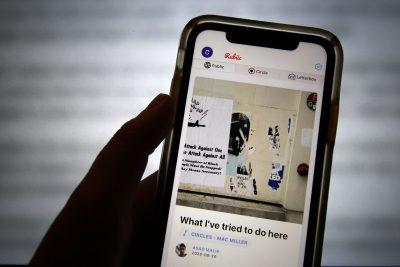Now more than ever, Americans crave escape, and many turn to technology and social media to do so. Between 46 and 51 percent of adults in the United States were spending more time on social media this spring, according to The Harris Poll, and studies indicate that behavior could damage people’s mental health.

But one Boston University graduate student has taken note of the times, and created an app to address that harmful connection.
BU computer science graduate student Asad Malik designed “Rubiic” to stand out against traditional social media platforms by prioritizing self-expression and reflection.
He said he created the app out of his own frustration with social media and what it focuses on. When dealing with the emotional toll of the pandemic, Malik said he wanted to provide true connection — something he thinks social media lacks.
“The respect that these sort of deeper posts deserved, they weren’t getting on the platforms that we have today,” Malik said. “So, I started from there, which was, ‘OK, what would a place where I would feel comfortable expressing my different thoughts and feelings look like?’”
On Rubiic, vulnerability is key, Malik said. Users are invited to open up through sharing music, videos and other forms of multimedia, or using the special journaling feature to reflect.
“I’m trying to hit that middle ground, which is essentially to create a space where you feel comfortable expressing whatever it is that might be on your mind in a space that feels intimate,” Malik said. “But at the same time, you have options to share what you want out of that, or out of your space and within the app.”
Malik said the app is at the intersection between psychology and technology, and represents a better approach to mental health than simply quitting social media entirely.
“It’s an approach to creating better mental health through technology,” he said, “because a lot of the conversations that are via social media don’t talk about how you can counter the negative social effects to technology itself.”
Sydney Ballard, a freshman psychology major in the College of Arts and Sciences, said she appreciates that Rubiic makes journaling easier.
“It makes it way more accessible, because then at any time during the day, you can just sit down, or if something’s really bothering you and you just write it out,” Ballard said, “you have the option to just pull out your phone and add it right there.”
Ballard said she thinks a more mature audience would be suitable for the app, given its personal and intimate nature.
Collaborating with a mental health or psychology professional would be advantageous to the app, she said, because it focuses on mental health.
Malik said he is positive about Rubiic’s future, and hopes to get the word out about it — as well as the benefits of journaling and reflecting — to the public.
“This experience has just been taking it one step at a time,” Malik said, “and the next step is really communicating my message.”















Thank you for this great piece of student journalism!